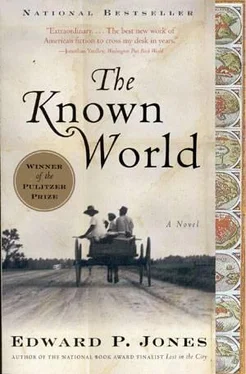Augustus said to Stennis before he went to Darcy, “I owe you the same licks that you gave me back in Virginia. I want you to know I be owin you good.”
“I spect everything cost somethin, even some licks from way back in Virginia.”
“And when I come for you, you gon know it,” Augustus said.
“I done figured that in the cost of my business, too.”
“I wanna to go home,” Augustus said. “I wanna go home and I think you know the way to help me.”
“We all wanna go home.”
“I want to go home.”
Stennis noted that these were the first words Augustus had spoken since the deaf-mute stunt in South Carolina. “I see you back to talkin again.”
“I ain’t had nothin to say.”
Stennis checked the chains again. “You have a good night.”
“Let me just slip away,” Augustus said.
“He would know that I the one that opened the door for you.”
“Then come with me. We can go together. Us together.”
“That ain’t in my power.”
“I say it is.”
“It just ain’t. He be my bread and butter. Jam, too.”
“Back home,” Augustus said, “I be my own bread and butter.”
Stennis sighed. “I can see that.” He stood up. “I can see that with my own two eyes.”
Darcy shouted, “Stennis! Stennis! Where you at?”
“Over here, Marse.” Stennis began walking away.
“Just let me slip away.”
“Stennis!”
“Comin, Marse!”
“Well, come on then. Come here and rub my feet.”
The morning after Caldonia Townsend made love to Moses her overseer for the first time, she woke about dawn and sat up in her bed and watched the sun come up. She had thought she would not sleep very well, but the night had been kind and she slept many hours without disturbance once sleep did arrive. She had had a dream just before waking of being in a house smaller than her own, a house she had to share with a thousand others. As she sat watching the sun she tried to remember more about the dream. Nothing came to her except the memory of someone in the dream saying that people in the attic were burning other people. The house Henry had built had no attic. She always slept with the curtains open, something Henry had gotten used to. Who else in this world could accept sleeping with the curtains open? she thought and raised her knees to her chin. She felt no guilt about Moses, which surprised her. Someone down in the fields, a woman, was singing. She soon realized that the woman was Celeste. It was not a sad song Celeste was singing and it was not a happy song, just melodious words to fill the silence that would otherwise be claimed by the songs of the birds. The room had been dark when she first opened her eyes, but as the sun rose and rose, it took Celeste’s song and carried it with the light to every corner of the room, and little by little the stiffness of sleep went out of Caldonia and she stretched and yawned and wondered what in the end she would do about Moses. She did not think of him the way she thought of Henry Townsend the first morning after she met him. That morning she had gotten out of bed, afraid and weakend by the fear that she would not ever have the pleasure of seeing Henry again. Had she known that he had had similar feelings, she would have had the strength she had this morning as Celeste’s song came to her one clear and undeniable word at a time.
She dressed and went out into the hall where the sun, even with a window at each end of the hall, was taking its time getting to. She heard Loretta stirring in her own room near the stairs but Caldonia did not knock and tell her maid to accompany her. In the kitchen, Zeddie the cook was at the stove and her husband Bennett was stacking wood in the wood box. “Missus,” Zeddie said, “what can I get you for your breakfast?” “Nothing just yet,” Caldonia said and opened the back door. “That air got a few teeth in it this mornin,” Bennett said. “You want me to get you a coat?” “No, I’m fine,” Caldonia said and went out and closed the door behind her.
The air did indeed have teeth in it, but she warmed as she walked to the cemetery with its one occupant. The mound of dirt had settled even more since her last visit. A tombstone had been ordered, but the man had said that it might take a month for it to be delivered. Standing at the foot of Henry’s grave, she wished she had brought flowers from her garden. “Am I forgiven?” she said. The flowers from her last visit, just two days before, still had some vigor in them, and they were atop flowers from four days before that were browning and becoming one with the soil. “I still am your wife, so am I forgiven?”
Moses came to her that evening and she gave him no indication that he was to rise from the chair and come to her. So he talked of the slaves’ work from the wing chair, hair combed and the not-so-new-anymore shirt and pants clinging to him because the sweat had come even before he had set one foot in the kitchen. He had hoped that by having her again they would cross an irrevocable threshold. But there were no tears and no hint that she wanted him, so he sat in sweat and fumbled through a recitation of their preparations for harvest. Had he not been her slave, he might have gotten up and went to her just on the authority of last night. But the sun did not rise very high in Moses’s life, and it was only one day at a time and no one day was kin to the next.
“Tell Loretta to come in,” Caldonia said and he got up and left the room. He had not been out and down the back steps when she regretted sending him away. What would have been the harm in letting him hold me? she thought as Loretta asked if she might want coffee and a little pie before she went to bed.
As arranged earlier, she had Fern, her brother Calvin, and Dora and Louis, William Robbins’s children, to supper the following evening. Roasted chicken, one of Zeddie’s specialties, and the pumpkin soup that Fern was fond of. Fern, who had now owned Jebediah Dickinson for some weeks, had little to say, which was unusual for the loquacious teacher among three of her former students who saw her as one of the primary influences in their lives. When she did speak, it was generally about her troubles with an “obstreperous” slave who insisted on calling himself Jebediah Dickinson, even though his former master said he was really just Jebediah and Jebediah alone. “Dickinson,” the former master had said, “was stolen from my dead wife.” Everyone at the table noted that Fern was not herself, but they passed it off because they loved her.
“With him there,” she said after supper, “I feel as if I belong to him, that I am his property.” The young people laughed to hear her say something so extraordinary. They were all members of a free Negro class that, while not having the power of some whites, had been brought up to believe that they were rulers waiting in the wings. They were much better than the majority of white people, and it was only a matter of time before those white people came to realize that.
“Why don’t you sell him off?” Dora asked.
“I am afraid that all of Virginia knows him the way I know him and selling him would cost me more than I have already paid.” That made no sense to the rest of them, and they blamed it on the fact that Fern had had a glass of port, which was also not like her.
“Sell him off down the river, as they say,” Louis said.
“He would return,” Fern said, “repeat himself like a bad meal. That is just my poor metaphor for the evening, dear Caldonia. It is not a statement about our grand evening this night. I trust you understand my state of mind, dear Caldonia.”
“I do,” Caldonia said. “Zeddie could not do wrong with food if she were blind and without hands.”
“Precisely,” Fern said.
Читать дальше












